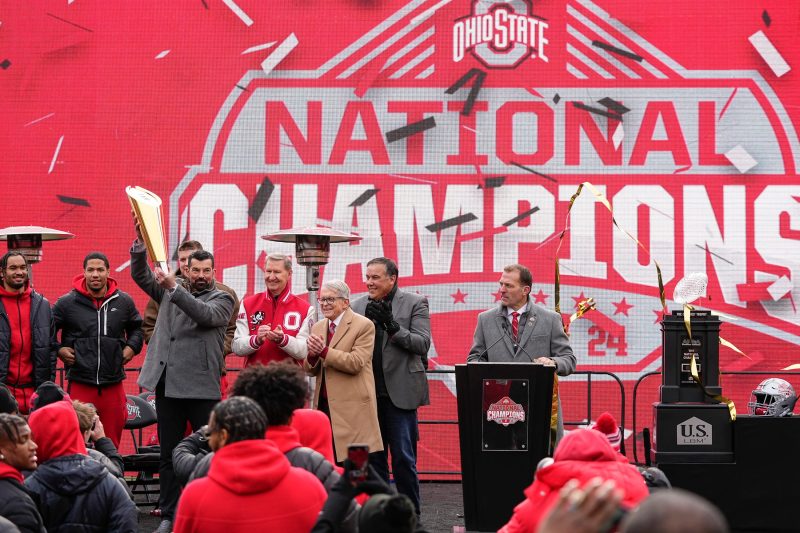
The date was Jan. 15, 2016, long before anyone conceived of a 16-team College Football Playoff, a transfer portal or seven-figure NIL deals for replacement-level basketball players. The place was San Antonio, where NCAA officials and college administrators gathered for their annual convention. And the topic; oh boy, was it a hot one.
By the second year of so-called “autonomy” for the Power Five conferences – a power grab that theoretically allowed the SEC, Big Ten, ACC, Big 12 and Pac-12 to expand athletes’ benefits without being slowed down by smaller schools – they were already out of big, controversial ideas.
But there was one issue creating significant debate within the room: A proposal that would allow schools to pay for lodging, meals and entertainment for up to four family members on official recruiting visits.
To normal people, unencumbered by the bureaucracy of tedium that rules college sports, this is common sense. Of course an athletic department with a nine-figure budget trying to attract top talent should pay lodging, meals and entertainment expenses for up to four family members.
But for these folks, College Athletics Brain always takes over. So naturally, someone in the room wanted to litigate exactly what that meant. After all, if you’re at UCLA, entertainment expenses could mean four courtside seats to a Lakers game that might be worth more than a two-bedroom house in, say, Starkville, Mississippi. And wouldn’t providing that for recruits just be … unfair?
That was the moment I realized most of these people representing the richest schools and conferences – many of whom are still in position to shape the future of college sports a decade later – were simply incapable of governing themselves, even though they had portrayed the ability to govern themselves as necessary to save the NCAA.
It’s not that the people who work in college sports lack the intellectual capacity to understand that these tiny, perceived competitive advantages from school to school and conference to conference are ultimately inconsequential to their collective business interests. Their culture simply doesn’t allow them to see the big picture through a froth of constant concern that one of their competitors is pulling a fast one.
It’s slightly humorous – but mostly pathetic – how little has changed in what drives the so-called leadership of college sports even as everything else in their world has changed immensely in the decade since.
Now here comes SEC commissioner Greg Sankey, the thin-skinned pedant of Birmingham, all up in his feelings as the league’s spring meetings get underway this week in Florida because some of his colleagues have dared to question the motivations behind Sankey and Big Ten commissioner Tony Pettiti jockeying for four automatic bids each in a new 16-team CFP.
“I don’t need lectures from others about good of the game,” Sankey said Sunday, meeting with reporters before what will surely be intense internal discussions about what the next CFP should look like. “I don’t lecture others about good of the game. And coordinating press releases about good of the game, OK, you can issue your press statement, but I’m actually looking for ideas to move us forward.”
Keep in mind, this was Sankey’s response to a series of questions about a proposal that would assign four CFP bids every year to the SEC and Big Ten before a single game has been played, while the ACC and Big 12 get only two guaranteed bids. If Sankey was expecting his colleagues to lap up that gruel and leave a five-star review, he’s not living in the land of reality. You can’t offer a strongarm and expect a handshake in return.
“In our own room, I’ve had athletics directors tell me directly that we’ve given too much away to arrive at these political compromises, that we move teams from outside the (top 12 in the rankings into the playoff),” Sankey explained. “How many of those compromises does it take?”
The scale of structuring a 16-team playoff may not be comparable to free meals on a recruiting visit, but they come from the same place: A never-ending battle in college athletics between those with the most power stacking the deck in their favor and those fearing that every acknowledgement of inherent inequality will be a ticket to second-class citizenry.
And the especially childish part of this debate is the SEC and Big Ten would be virtually assured of getting at least four teams into the Playoff organically nearly every year, notwithstanding a possible outlier here or there. It should be equally clear that codifying the so-called “4-4-2-2-1-1-1-1” structure into the CFP format would be a toxic indulgence by the SEC and Big Ten, yielding no practical value either for themselves or greater public confidence in the sport.
But the underlying takeaway is the same as it was when I listened to those debates in 2016 between the really rich schools and the kinda rich schools over recruiting visits: If this is how difficult it’s going to be for the SEC and Big Ten to reach an accord with the ACC and Big 12 over something that should be driven by common sense, what chance in hell do they have of pulling together and fixing the truly difficult issues swallowing their industry?
Intelligent, well-educated men and women making seven figures to be executives of a sports league are being reduced to children in a fight over playground territory because they overthink themselves into paranoia that one decision on the margins of a $1.3 billion annual enterprise is going to be unfair to them.
And you wonder why college sports is at a complete gridlock, now in Year 6 of begging Congress for legislation that will mitigate the chaos of the transfer portal and NIL.
But what gums up progress in college sports isn’t an ideological battle between the big schools and the small schools over the direction of the NCAA and how flexible its rules should be. It is, was and has always been the inability of the big schools to treat each other fundamentally as business partners rather than competitors.
The CFP debate is merely a symptom of a much more invasive disease, one that the key stakeholders in college sports would rather pout about than make any significant concessions to cure.
